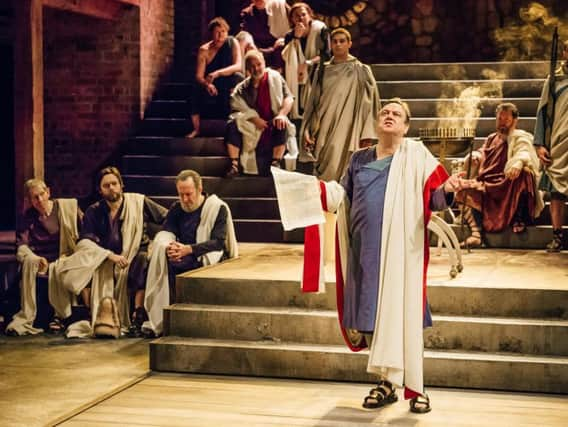REVIEW: Power, glory and humanity in RSC's magnificent Imperium


What a way for the RSC to end its Rome season. The past few months of fare on the Stratford stage have occasionally tested the patience: there have been mediocre productions of good plays and good productions of mediocre plays. Then there have been those times when, just occasionally, play and production have reached the same heights. So it is an extraordinary joy - not to mention relief - to find that almost every minute of these six hours is theatre of sublime quality: a delight for the senses, a feast for the mind and a salve for the soul.
Here we have a work epic in scope yet personal in feel. It never feels weighed down by its remarkable ambition: there is a lightness of touch throughout. It's magisterial without being pompous; it is at times gloriously irreverent but never at the expense of emotional power. Above all, it is warm and profoundly human.
Advertisement
Hide AdAdvertisement
Hide AdRobert Harris's best-selling Cicero trilogy has been adapted for the stage in sparkling style by Mike Poulton and is directed by Gregory Doran with a visual imagination that never distracts from the words, which are the real stars here. Words are what gave the low-born Cicero his power; words are the reason we know anything about him. These two plays can be interpreted as a love letter to language above all else.


But there is of course a great deal else going on. Cicero is portrayed as a hero who, for the most part, rails against the idea of heroism. For him, the ideals of the Roman Republic - especially the rule of law - are all that is worth fighting for. But, having become a Consul, he finds himself fatally compromised and vulnerable to treachery as he tries to keep the peace. His resistance to conflict - which others construe as cowardice - proves his downfall but protects his dignity. The contrast between the flawed man of reason and the emperor who believes himself divine has a sharp and disturbing resonance.
Perhaps the highest compliment that can be paid to Richard McCabe's portrayal of Cicero is that it is apparently effortless. There is an ease to all he does, a casual brilliance. In manner and demeanour, he evokes a less lugubrious Peter Mannion, the character played by Roger Allam in political sitcom The Thick of It. Every syllable is articulated with leisurely clarity and deep intent. His performance is coloured at various points with arrogance, weariness, self-importance and a sense of humiliation, but there remains an irreducible core, a sense of purpose and wisdom that even power fails to occlude completely.
Yet Cicero, impressive as he is, is only really half of a double act. Tiro, his slave and secretary, is integral to proceedings - not only in terms of plot, but in terms of this production. His narrations are an invaluable component: he frequently breaks off from a scene to let the audience know a bit more about what's happening and who's who. Joseph Kloska plays the role with irrepressible wit and verve; he is hugely likeable, with a Horrible Histories-esque appeal. We are with him all the way on this journey and feel every bit of his admiration for and frustration with his master. He lends the plays an emotional tenderness which grows quite unbearable towards their end.
Advertisement
Hide AdAdvertisement
Hide AdThen there's Siobhan Redmon, who is utterly searing as Cicero's wife Terentia; Peter De Jersey as an outrageously charismatic Julius Caesar; Joe Dixon, a terrifyingly wild Mark Antony. Top-class performances abound.


Each play is presented in three parts, each with exquisite dramatic contours. The action takes place in front of a mosaic whose gaze regards the action with a bemused indifference; it will outlast all of it. Above the stage at all times hangs a vast orb which, although ostensibly benign, carries a sense of mysterious threat, and on which is projected an array of superbly executed images: it becomes the planet Jupiter at one point, and hosts an ominously beautiful murmuration of starlings at another. There is much for the ears, too, from the stabbing intensity of the music to an overwhelming choir of voices to the squelch of a pickled human head in a bucket.
The only missteps are those that have dogged the RSC this season: the obligatory Trump reference (is there some local bylaw stipulating that each play must contain one?), some uncomfortable Brexit-related jokes, and yet more hoodies (Roman-styled, but hoodies nonetheless). Then there are the deeper problems that the RSC really needs to address: conservative casting and a belief that any regional accent is inherently funny and almost always possessed by a stupid person. It makes the face hit the palm and the heart to sink; the RSC is better than this.
But the RSC has done nothing better this season than Imperium. In fact, it has done nothing better than Imperium for a while. It emerges from the Rome season a little bloodied, perhaps, but triumphant. How very Roman.